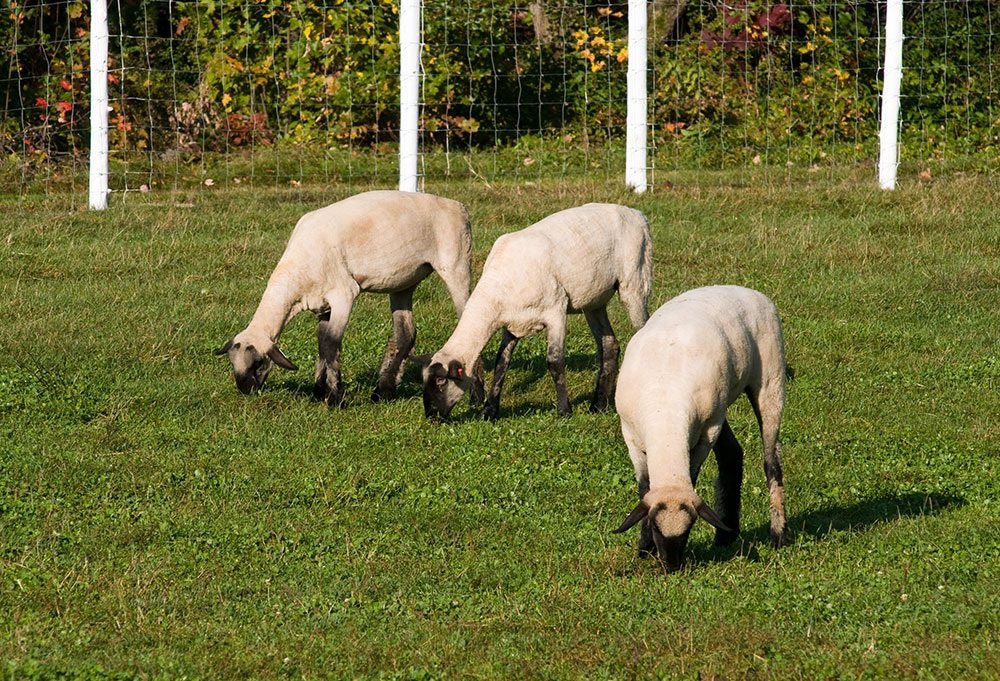FAQ: Meningeal Worm in Maine Sheep
By Anne Lichtenwalner DVM PhD, University of Maine Cooperative Extension
 “Brain worm” of sheep: what is it?
“Brain worm” of sheep: what is it?
Meningeal worm (“brain worm” or P. tenuis) is a nematode parasite that replicates within white tail deer (WTD), and can infect other ruminants.
Does it kill the deer?
It doesn’t damage the WTD, which is its “definitive” host (the host in which it reproduces).
How does it spread to other animals?
This parasite successfully breeds within the infected WTD, laying eggs that hatch inside the WTD, and live larval forms are passed in the WTD feces. An intermediate host, one of a group of snail species, can then consume the larvae, which develop to an infective stage and are disseminated in the pasture by the snail. These forms can be consumed by the sheep when grazing, either by consuming the snail or its larvae-laden slime.
What happens once a sheep is infected?
The larval brainworms migrate out of the sheep’s gut and along nerve tracts until they reach the spinal cord, and eventually the brain, causing severe damage along the way.
How can you tell if a sheep has brainworm?
The sheep may show lameness that progressively worsens, along with other signs of neurologic disease (staggering, blindness, strange behavior). These symptoms are similar to those of rabies, listeriosis, PEM, or some viral diseases. There isn’t a readily available blood test, but your vet may be able to assist with selective treatment if it’s suspected.
Are there ways of preventing it?
Control consists of prevention: keeping deer away from pastures if possible, reducing snails on pastures or periodically using a treatment, such as an ivermectin-type drug, in the sheep in order to try to kill the migrating larvae.
Are there any problems with using a wormer monthly?
Due to the fact that there is no “label” use of ivermectin, or other wormers to kill P. tenuis, it’s advised to have a veterinarian evaluate your flock and prescribe this “off label” use of drugs. As well, overuse of wormers can lead to development of resistance in other parasites, such as the barberpole worm (Haemonchus contortus).
What’s the best and most effective preventive?
- Make pastures less inviting to deer.
- Keep your sheep in open areas; place fencing well within “verge” zones.
- “Verges” are where the pasture ends and the woods begin: deer like these areas.
- Use livestock guard dogs or other animals (donkeys, llamas, etc.) to keep deer (and predators) out of your flock.
- Keep your sheep in open areas; place fencing well within “verge” zones.
- Make pastures less inviting to snails and slugs, and keep sheep from grazing where snails have been.
- Fence sheep out of seasonal streams and wetlands.
- Mow longer grass near wetlands to reduce snail habitat.
- Keep your sheep on dry lots during very wet periods.
- Reduce leaf piles and other “clutter” that attracts snails.
- Walk your pastures often to assess snail populations.
- Consider biologic controls.
- Consider using ducks or other poultry in “tractors” (moveable pens) to eat snails on pastures.
- Be careful using any snail treatments (molluscicides) on pastures, as residues may be toxic to fish and wildlife, and possibly to your sheep.
Information in this publication is provided purely for educational purposes. No responsibility is assumed for any problems associated with the use of products or services mentioned. No endorsement of products or companies is intended, nor is criticism of unnamed products or companies implied.
© 2020
Call 800.287.0274 (in Maine), or 207.581.3188, for information on publications and program offerings from University of Maine Cooperative Extension, or visit extension.umaine.edu.
The University of Maine is an EEO/AA employer, and does not discriminate on the grounds of race, color, religion, sex, sexual orientation, transgender status, gender expression, national origin, citizenship status, age, disability, genetic information or veteran’s status in employment, education, and all other programs and activities. The following person has been designated to handle inquiries regarding non-discrimination policies: Sarah E. Harebo, Director of Equal Opportunity, 101 North Stevens Hall, University of Maine, Orono, ME 04469-5754, 207.581.1226, TTY 711 (Maine Relay System).
